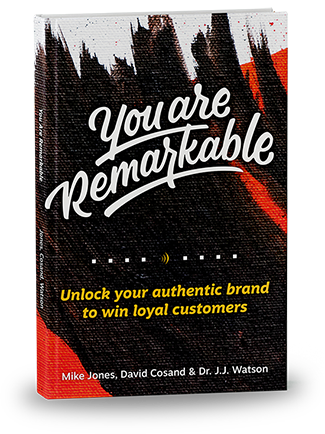Everyone is trying to understand brand, constantly looking for new ways to express it. One model is to think of a brand as a “person.” And this may be a helpful model. But like all models, it can’t be true in every sense. While a person may be all about him or herself, a brand, to be successful, must always be about something bigger.
It’s not just all about finding yourself or expressing your inner beauty. Your mom may love you and tell you everything you do is good. But a company has to serve people, both to survive and as an ethical responsibility. And this brings an elevated form of accountability. No longer is it good enough to be yourself. You also have to build your capacity to serve.
And it’s for this reason that a company’s brand tends to be more than that. It’s much more developed, much more intentional, and usually somewhat more “grand.” But it may never occur to most companies that their brand serves something bigger and more important than them.
Let’s talk about how your brand connects people (customers) with a why that’s bigger than any of you.
Bigger than a person. Smaller than a “Why.”
“Grand.” It’s kind of a big word for this. Some brands represent a worldwide presence. Some want to seem worldly and connected, potentially connecting you to the sophisticated parts of the world or the sophistication of the world. Others are smaller and don’t take themselves quite as seriously. These brands are a lot more humble. But they still occupy a place in your life. You know where they fit in.
But a brand is more than a person, and it’s less than its “why.” In other words, it’s less than its reason for being. Let me give you an example. A church might have its own personality and culture, but it’s not greater than its object of worship.
And those communities that tend to descend into petty bickering every time they meet are a perfect example of a dysfunctional organization that, because of a lack of higher purpose, leaves individuals to follow after the next-strongest motivation: personal ambition.
Any brand worth its salt brings people together, not for their own sakes, but for the sake of something larger.
Brands are Really “First Followers”
Some communities and organizations really are about the individual. Think about a singles bar. Lots of people go to places like that because they’re in need of something. Or a poker club, where you can compete playing a game you like. Or a pickup basketball game. You don’t have to like anyone in your group to want to hang out or compete. It’s possible that you’re involved to meet one of your needs and nothing more.
So is your brand about making money? Is it about filling your needs? Is it about giving employees a job? There’s nothing wrong with any of those things. But without a larger “why,” you can’t connect people to something bigger.
Some brands have figured this out. They know that it’s not about them, but about the values they hold. And their success is tied to helping people live out their values through their lives.
- What about Coca-Cola? It’s not just about a sugary carbonated drink. It’s about “a Coke and a smile” or teaching the world to sing in perfect harmony. It’s about something bigger, maybe even something worldwide.
- What about MasterCard? They ran a series of ads a long time ago that stick with me today: “So worldly, so welcome.”
- What about Nike? They’re bigger than a shoe. Their success is in reference to that which they stand for and their ability to express that and give it meaning.
Brands like Nike aren’t what we’re after. Nike isn’t the sum and substance of our desires and aspirations, it’s just a well-developed version of those ideas. So when we’re looking for inspiration, there is no replacement.
Nike isn’t what we desire. It’s just a really well-developed first follower, showing the rest of us how to live out those values.
This should be encouraging to most of us to whom branding seems so grandiose and transcendent, but feel that the problems we solve are too mundane. Regardless of who you are, if you develop your values in a way that makes sense, no matter how mundane your business is, you will become irreplaceable.
The question is how do we get from there to here? And the answer is, we just have to think differently. Simple, right? Let’s take a look at what I mean.
“This BWM has anti-lock brakes.”
When I give an example of how a product becomes a brand, I usually use the example of BMW’s anti-lock brakes. Through creative re-imagining, the brakes become a life-changing catalyst, making you a better person.
In other words, they go from being a product attribute to being a customer benefit, to potentially becoming something that can drive the values of a car and even a company. Here’s what I mean.
It’s just brakes.
Anti-lock brakes, by themselves, are an attribute of a vehicle. They’re literally “about” the vehicle. Anti-lock brakes aren’t about the customer until you’ve applied them to a use case.
Anti-lock brakes are just an attribute of the vehicle. If you really want to get people excited, you make it about them…
Anti-lock brakes: More than brakes. They help you stop faster.
Anti-lock brakes, in order to feel relevant to people, need to be told in a story about a person. They need to be shown, not told. So we apply it to the person’s life and say that they will stop faster. Do you see the difference? The statement is now not about the car, but about the driver.
If you buy the new BMW, you will stop faster. You can even extend that depending on your audience to talk about the performance of the vehicle. Not only does it accelerate quickly, but your brakes will give you that tight handling on the road that will make it feel like the car is your finger and the road is the glove. Or like your car is one with the road.
But none of these really matter in the value sense. None of this, on its own, stands for anything. But some of these things can ladder up to something. That’s where we come to values.
The BMW with anti-lock brakes makes you a better dad.
Now we’re starting to get into values territory. The values of a brand help people live their lives according to their own values. It’s like having a friend, which we should all have, that sees certain things in a more refined point of view than we do. These friends should have a more developed sense of something good and right in order to help us think about life better. Brands should do that.
And they do. No matter what you think, they do. From the veteran Army Ranger selling whiskey and “Liberal Tears” gun oil, to the financial magazine encouraging you to become a more sophisticated investor. All of these things are helping people live out their values and become more who they want to be in a way consistent with how they want to be understood.
Liberal Tears gun oil makes you a better American.
The Economist makes you more sophisticated.
Tell me what you sell and how you sell it, and I will tell you what you stand for.
It doesn’t take a genius to understand that someone’s actions represent what they believe. And sometimes this is truer than we give it credit for.
The English language is full of quotes illuminating how easy it is to tell what someone believes by looking at their consistent actions. The idea is that, regardless of what you say you believe, you will act on what you believe.
Let’s use another car company to illustrate. If Volvo were always running extra safety tests, always finding better ways to stop faster, preserve the safety and prevent accidents, then you think they value human safety. Because that’s what all of their actions point toward.
The Caveat: Beware of Negatives
It’s fine to start by talking about what you’re against. That can really help you get started, especially if you ask why. But negatives can lead us to hypocrisy. Here’s what I mean.
Good and evil are not just equal and opposite. Evil usually responds to good. In fact, it gets its very definition from good. If all you are is against something without being in service of something bigger, then you could come up empty or worse, hypocritical.
Imagine someone being so dead-set against a political party (hard to imagine, right?) that they hate everything that party does. Pretty soon, you start seeing inconsistencies in the person’s judgment. They excuse their party and then attack the other party over the very same kind of violation. In the end, you find out that they’re not about principle at all, but are really about what they’re against.
Being against something is not a replacement for being for something. They are totally different in nature. When you’re for something that has substance then you know that what you have will last and it demands consistency. You win in two ways: not only do you have the utilitarian satisfaction that it will last, but you also stand a much better chance of being right about standing for something that’s actually, objectively good.
So beware of stopping with what you’re against. If you’re against something, let it be because of something that you are for.
Your “why” is bigger than your brand.
Remember: your brand isn’t the why. It doesn’t need to be the be-all, end-all of a particular value. It’s not a religion, and you don’t have to be the Pope. But it pays to understand how your brand might connect people in a more meaningful way to their “why.” And this should give you freedom.
You don’t have to be grand. You don’t have to be huge. You don’t have to be world-changing. Be where you are, doing what you love, for people you care about, for the right reasons. And then work on emanating those values so consistently and thoughtfully that you naturally arrive at your brand. If you do this, you’ll find that expressing your brand is much easier. If you’re already living out your brand, saying it becomes the easy part. Because people can tell who you are by what you do.
Now it’s up to you. How will you develop your own personality, your style, and your disciplines in order to make it easy for you to live out those things that you’ve always wanted to live out anyway?
If you’re looking for more practical tips like these, consider signing up for our newsletter, registering for our next webinar, or subscribing to our book launch mailing list which will have tons of exclusive insights from our upcoming book.



